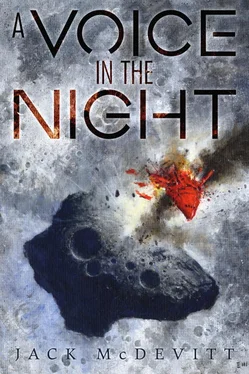“I would not go so far,” he said. “But I must confess to a facility for the game.” I had provided Staunton with the voice of a local weatherman, added a British accent, and it seemed to fit perfectly.
“I wonder,” I said, “if I could interest you in a brief match? I have a friend who believes himself skilled, but who stands in need of some instruction in humility.”
Staunton took a moment to respond. “When and at what stake, sir?”
“Perhaps,” I said, “you would consider ten games, starting this evening, at a hundred pounds sterling. Winner take all.” Was that an appropriate amount? I hadn’t thought to research that aspect of the negotiation.
“What is your friend’s name?” He sounded bored.
“Morphy,” I said.
“Doubtless he will wish odds of knight and move?”
“I think he would be willing to play you even, sir.”
“I see.” Another pause. “He thinks rather highly of himself.”
“Yes. He needs to confront reality.”
“Indeed. Well, certainly. I would be happy to oblige.”
“Very good.”
“When would we start?”
“At any convenient time.”
I set up the board and pieces and activated Paul.
We had discussed how he was to behave. Paul had been, during his brief career, a perfect gentleman, never glared at an opponent, didn’t light up when he spotted a blunder, never gloated, never taunted. He pronounced himself pleased to meet Mr. Staunton, and talked as if there were no history between them. For Staunton, of course, there was no history.
The Englishman was convivial, almost garrulous, during the introductions. Paul said little. He was, in fact, barely civil. But his opponent seemed not to notice.
The game was not timed. Chess clocks were a later invention. But there was no need. Once Paul, playing White, pushed his king pawn forward, things went quickly.
Staunton defended with Philidor’s, a system well-suited to anyone who likes to play defense. It was difficult to storm, but generally led to cramped positions for Black. I’d expected Paul to simply run his opponent out of the game, but it didn’t happen. The Englishman built a position which looked impregnable, and he even established a strong knight outpost in the center of Paul’s lines. For a time I thought they were headed for a stalemate.
But the end came with seductive suddenness. Staunton had castled behind a solid screen of pawns. His king’s knight kept watch over the formation. But a rook swept in and took off the knight, both bishops plowed into the cluster, and the wheels came off. In a voice I could hardly hear, Staunton announced his resignation. “Very good,” he said. “You play quite well for an amateur, Mr. Morphy. I shall take you seriously next time.”
“Thank you,” said Paul. “It was an honor. Shall we continue in the morning?”
“I wish I could oblige.” Staunton replied. “Unfortunately, my dear young fellow, I’m rather busy just now. Working hard on my treatise.”
“Really?” I said.
“Yes. Openings analysis. There’s a great deal happening in the game these days. As I think I explained to my colleague, Dr. Case, I’m editing a collection of medieval poetry, and that must take precedence. I’m afraid I was distracted, thinking about Chaucer, you see. Took my mind off the game and failed to give our young friend adequate competition. I do apologize, Mr. Morphy.”
“We have nine more to play,” said Paul.
“Of course. We will, never worry about that. And I’ll try to demonstrate more effectively than I did this evening why an attack like the one you showed me just now is really rather premature. I’ll get back to you as quickly as I can.”
He shut himself down.
Paul’s operational lamps went scarlet. “He’s doing it to me again,” he said.
“No, Paul. It’s over. You’ve beaten him.”
“It isn’t over, Harold. Listen, it happened this way in London, too. We played a couple of consultation games. But everyone knew it was him against me. I won those games. But it meant nothing. I need to beat him beyond any question of doubt, to hear him admit the difference between us.”
I stared at the lamps. “Okay,” I said reluctantly. “I’ll talk to him.”
William Jennings Bryan was a better man than either of these idiot chessplayers. Little men like Staunton never bothered him. And he would never have run from someone like Morphy. He could not have won. He never won. But that’s why he was magnificent. He never won, and he never compromised.
It was several days before Staunton would even respond. And when he finally did, it was only to protest. “I’d really like to be of assistance. But surely you, Dr. Case, recognize the priorities of these things. How can I, in good conscience, put my work aside to play a game?”
“Surely the match would not take that much of your time, sir.”
“Of course not. But I would be unable to give it my concentration. That would be unfair to all involved. Please try to explain to Mr. Morphy.”
“Mr. Staunton, you agreed to a match.”
“And I shall play it. Somehow. In the meantime, you may inform your associate that I will endeavor to compensate his patience by providing some personal instruction on those aspects of his game which clearly need attention. He’s quite talented, you know. With proper guidance, he should be able to compete reasonably well in the front rank of European players.
“Mr. Staunton—.”
His amber lamp went out, and I was alone.
After that, Paul would not talk to me. And night after night I drifted to sleep among the bleakest, darkest landscapes of Bach, DeBussy, and Schoenberg.
I’d made a mistake reconstructing Staunton. I should have gone for Freud. Why wasn’t either of them more like Bryan? And while Paul’s gloomy symphonies echoed through the house, the name that was on my lips was Bryan.
Bryan, Bryan, Bryan.
I couldn’t infuse Paul’s character with a generous helping of the old crusader without losing the Morphy persona. But there was another possibility.
Historians of the latter half of the nineteenth century are in and out all the time now to talk to Paul. Usually, they want to check some detail of daily life in the South, or perhaps gain an insight into the perspective of a man who lived through it all.
Other projects, based on my results, are underway. One researcher in Los Angeles claims to have used Napoleon’s tactics to reconstruct his psyche. And a team in Seattle is working on Caesar.
In the meantime, Paul seems quite happy. There is a problem, though. Morphy would like to give up chess, just as he did once before. But challenges come from around the world, and Staunton continues to press him for “one more game,” explaining how much he would enjoy showing Paul how his game could be improved. But unfortunately something always gets in the way.
IT’S A LONG WAY TO ALPHA CENTAURI

“Charlie, if I never hear another stock ticker, I’ll be happy. I’ve quit.”
“You’re kidding.”
“I never kid.” Jake raised his beer. “I am out of here. I am going to leave. Vamoose. Bail out. In fact, I told them today.” Jake always looked as if life was going well. He had a big smile and bright brown eyes and an attitude that always seemed bulletproof against life’s challenges.
Читать дальше











